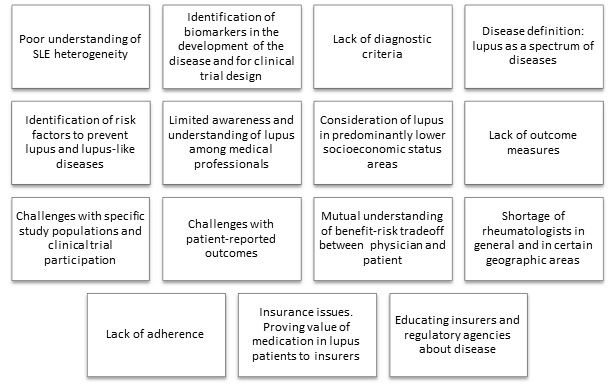Session Information
Session Type: ACR Poster Session B
Session Time: 9:00AM-11:00AM
Background/Purpose:
The Addressing Lupus Pillars for Health Advancement (ALPHA) Project is a global consensus initiative seeking to identify and prioritize top barriers in lupus impacting diagnosis, care, treatment and research, with the goal of improving rates of accurate and timely diagnosis, increasing access to care, and improving short and long-term patient outcomes. This abstract presents Phase I consensus building and prioritization process methodology, and findings of initial project activities.
Methods:
The Lupus Foundation of America and its research partner, Tufts Center for the Study of Drug Development, assembled a Global Advisory Committee (GAC) of 13 lupus experts across 5 countries to provide input and support throughout the effort. A mixed methods approach is being used to elicit concepts seen as major barriers in lupus diagnosis, care, treatment and research, then consolidate and confirm those selected as most urgent. First, a brief web survey was distributed to each GAC member to begin concept elicitation. Identified items were then ranked during a GAC meeting, and will be presented through an in-depth semi-structured interview among 22 stakeholders representing industry, academia, regulatory bodies, patient/advocacy groups, clinicians, and researchers. Finally, an online survey among 200-500 individuals will further validate and demonstrate consensus around top barriers in a broader audience for this Phase I initiative.
Results:
GAC member response rate was 85% for the concept elicitation exercise. Findings are shown in Figure 1. 15 main concepts were identified, with substantial discussion on lupus heterogeneity, lupus as a spectrum of diseases, and the importance of biomarkers in trial design and understanding of the disease. Categorization and prioritization of these concepts is seen in Figure 2. Notably, all GAC members cited issues surrounding disease definition and diagnosis as the most significant burden in lupus. Half also cited clinical trial design and availability and side effects of current medications as significant burdens.
Conclusion:
The ALPHA Project is a collective, iterative research effort among lupus key opinion leaders and diverse stakeholder groups to build consensus and create actionable steps to advance the field. Findings from the GAC meeting showed initial consensus on key priority issues, such as lupus heterogeneity, disease definition, and clinical trial design.
Figure 1. Concept Elicitation of Top Barriers in Lupus Diagnosis, Care, Treatment and Research
Figure 2. Concept Prioritization from GAC Survey of Top Barriers to Lupus Diagnosis, Care, Treatment and Research
To cite this abstract in AMA style:
Tse K, Daly RP, Hanrahan L, Anderson A, Arntsen K, Bae SC, Bruce IN, Costenbader K, Dörner T, Kao AH, Manzi S, Morand E, Raymond S, Rovin BH, Schanberg LE, Werth VP, Von Feldt J, Getz K. Global Consensus Building and Prioritization of Major Challenges in Lupus Diagnosis, Care, Treatment and Research [abstract]. Arthritis Rheumatol. 2018; 70 (suppl 9). https://acrabstracts.org/abstract/global-consensus-building-and-prioritization-of-major-challenges-in-lupus-diagnosis-care-treatment-and-research/. Accessed .« Back to 2018 ACR/ARHP Annual Meeting
ACR Meeting Abstracts - https://acrabstracts.org/abstract/global-consensus-building-and-prioritization-of-major-challenges-in-lupus-diagnosis-care-treatment-and-research/


